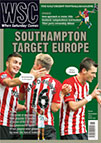 Huw Richards reviews Swansea City documentary Jack To A King, charting the club’s rise to the Premier League
Huw Richards reviews Swansea City documentary Jack To A King, charting the club’s rise to the Premier League
That the Swansea City film documentary Jack To A King briefly had a higher average score than perennial “best ever” The Shawshank Redemption on the IMDB film website is as statistically meaningful as the league tables newspapers insist on printing after one match. But approval from amateur reviewers and short extensions to planned runs in four west Wales cinemas suggests that JTAK – out on DVD and digitally in December – is a hit with its target audience, and with good reason.
It looks terrific, has big-screen production values and vividly recalls familiar scenes and stories. There is achingly evocative footage of the old Vetch Field and some great match action. The film-makers found compelling voices. James Thomas, whose goals kept the Swans in the league in 2003, is gently amiable while Leon Britton is engaging, observant and thoughtful. Fans of all clubs will recognise the feelings director Martin Morgan describes from the Championship play-off final against Reading, while fellow director David Morgan gives the narrative its emotional core.
The quality of those voices made it possible to dispense with traditional documentary props. There is no voiceover narrator or outside expert analysis – although the happy accident that fan Huw Bowen is also Professor of History at Swansea University enables some valuable perspective-setting – and no captions introducing speakers. This last may leave those not in the know a little puzzled at times.
Bookending Swansea’s recent history with the galvanising battle against unpopular owner Tony Petty in 2001 and promotion to the Premier League a decade later makes dramatic sense. Securing an interview with Petty was a coup, but his pleas in mitigation are outweighed by clear evidence that he was not, as asserted at the time, the only potential buyer and club employees recalling how they frantically hid cash whenever he was on the premises. To thank him – as executive producer Mal Pope has said some do – for the club’s subsequent rise is akin to crediting Andy Coulson for raising awareness of press intrusion.
One particularly memorable sequence recalls Petty’s sale of the club to the current owners, offering the compelling image of £20,000 in Tesco bags while leaving unexplained the logistics of extracting such a sum from cashpoints. The one real misjudgement is interviewing the “North Bank Alliance” opposition group in balaclava masks, making them look both nastier and far more serious than they ever were.
Fans of other clubs wanting to know what enabled Swansea’s new owners not only to survive, but prosper beyond all reasonable expectation, will find hints rather than exposition. But the film rightly identifies unpretentious chairman Huw Jenkins and, on the field, Roberto Martínez, as the key individuals along with the commercial transformation enabled by the move to the council-funded Liberty Stadium in 2005. Sequences in which Jenkins’ and Martínez’s parents talk of their contrasting sons and the crumbling Vetch is juxtaposed with the Liberty are particularly effective.
Imperatives to tell the story in 99 minutes and make it personal inevitably claim victims. Chronology is sometimes shaky – although starting with Dylan Thomas’s “To begin at the beginning” then going almost straight to the 2011 play-off final shows a certain chutzpah. Managers Kenny Jackett, credited elsewhere by Jenkins as a vital system builder, and Paulo Sousa disappear, although John Toshack, manager last time the Swans went from the fourth to the first, looms Hitchcockishly at Wembley. The main loser, paradoxically given the emphasis on fans as owners, are the Swans Supporters Trust. That they were already in existence and not, as the film implies, created in response to Petty is no minor detail. An established, if new, Trust played a far greater role than one improvised out of crisis could have done.
Similarly concentration on the personal histories of directors serves, presumably unintentionally, to marginalise the Trust. The end title referring to them still owning 20 per cent of the club looks a forlorn late gesture at redress, and could, without spoiling the story, have added that Swansea remain in the Premier League and won the League Cup in 2013. But if JTAK is shaky on some detail, it gets the big picture right – a retelling worthy of a remarkable story.
From WSC 333 November 2014


